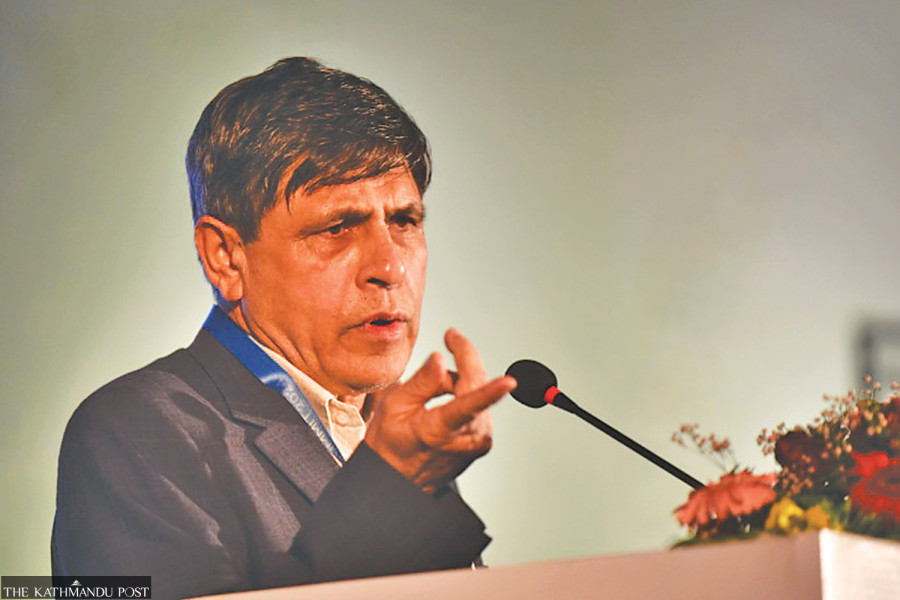National
Unified Socialist General Secretary Bhusal claims comprador capitalism is a major obstacle to Nepal’s progress
The leader emphasises his party’s goal as establishing Nepal as a socialist nation in his document to be presented at the party’s upcoming 10th general convention.
Post Report
In his political document, Ghanashyam Bhusal, general secretary of the ruling CPN (Unified Socialist), has described comprador capitalism as the major obstacle in achieving prosperity and socialism in the country.
Bhusal emphasises his party’s goal as establishing Nepal as a socialist society in his document that he will present at the party's 10th general convention scheduled to be held in Kathmandu from June 30 to July 4.
Bhusal, who is praised as a socialist thinker by many, states in the paper that socialism has been the goal of all thinkers, philosophers, sages and social reformers in history inspired by human ideals.
The Constitution of Nepal, which is a compromise document of major political forces such as Nepali Congress, the CPN-UML, CPN (Maoist Centre), Madhes-based regional forces and other fringe parties, defines Nepal as a ‘socialism-oriented’ country.
However, some left-leaning commentators didn’t buy his argument.
Dambar Khatiwada, a political analyst, said that Nepali politicians, mainly communist leaders, often try to advocate a “redundant political philosophy”. He argued such a tendency has rather restricted Nepal from progressing in a true sense.
“They first need to define what capitalism means before criticising it,” Khatiwada told the Post.
For Khatiwada, socialism is a political philosophy, whereas capitalism is the reality. “Should we live in fantasy or reality?” he said. “They must be clear about this at first.”
Bhim Bhurtel, an expert on political economy, describes Bhusal’s statement on socialism and capitalism as rebranding the old philosophy with new rhetoric, “which is meaningless”.
“The philosophical understanding of our communist leaders is like a vehicle driven by a novice,” Bhurtel told the Post. “Their statements presented in such party meetings and conventions don’t have any meaning because they don’t implement the same policies when they are in the government.”
Bhusal has proposed a ‘progressive parliament and a corruption-free party linked to production’ in his political document.
In the 24-page report, Bhusal claimed that this was the path to be followed by most of Nepal's Communists and Marxists.
While analysing political and economic life, one can see the challenges it has posed to the revolution, reads his report. “Crony capitalism has determined the general conditions of our economic life today, while parliamentary democracy has determined the general conditions of our political life.”
Bhusal has presented his arguments to prove the relevance of their move to form the CPN (Unified Socialist) by splitting the country’s largest communist party, the CPN-UML, in 2021.
He said the party was formed with an aim to develop it as one of the country's leading political forces.
“Our party was established with an objective to revive a genuine communist movement after serious ideological, theoretical and organisational deviation seen in the CPN-UML,” reads Bhusal’s political document.
The CPN-UML split in 2021 after a prolonged factional feud between the establishment faction led by party chair KP Sharma Oli and the dissident side led by former prime ministers Madhav Kumar Nepal and Jhala Nath Khanal.
The political document presented by the party chair Madhav Kumar Nepal in the politburo and central committee meeting held on May 15 severely criticised the mother party, the CPN-UML.
In the political document to be presented in the 10th general convention of the party, Unified Socialist chair Nepal has dubbed the UML “a right-wing opportunistic party”. “UML is a party that does not hesitate to destroy the constitution and democracy,” the document reads.
In his 57-page document, Nepal tries to justify the party split.
Then prime minister KP Sharma Oli had dissolved the previous Parliament twice. Oli’s unconstitutional move was one of the reasons for the party’s split as the dissident faction led by Nepal and Khanal strongly opposed Oli’s move.




 9.83°C Kathmandu
9.83°C Kathmandu













